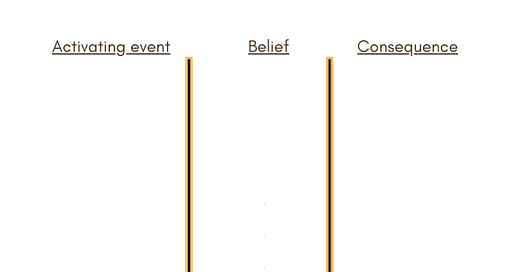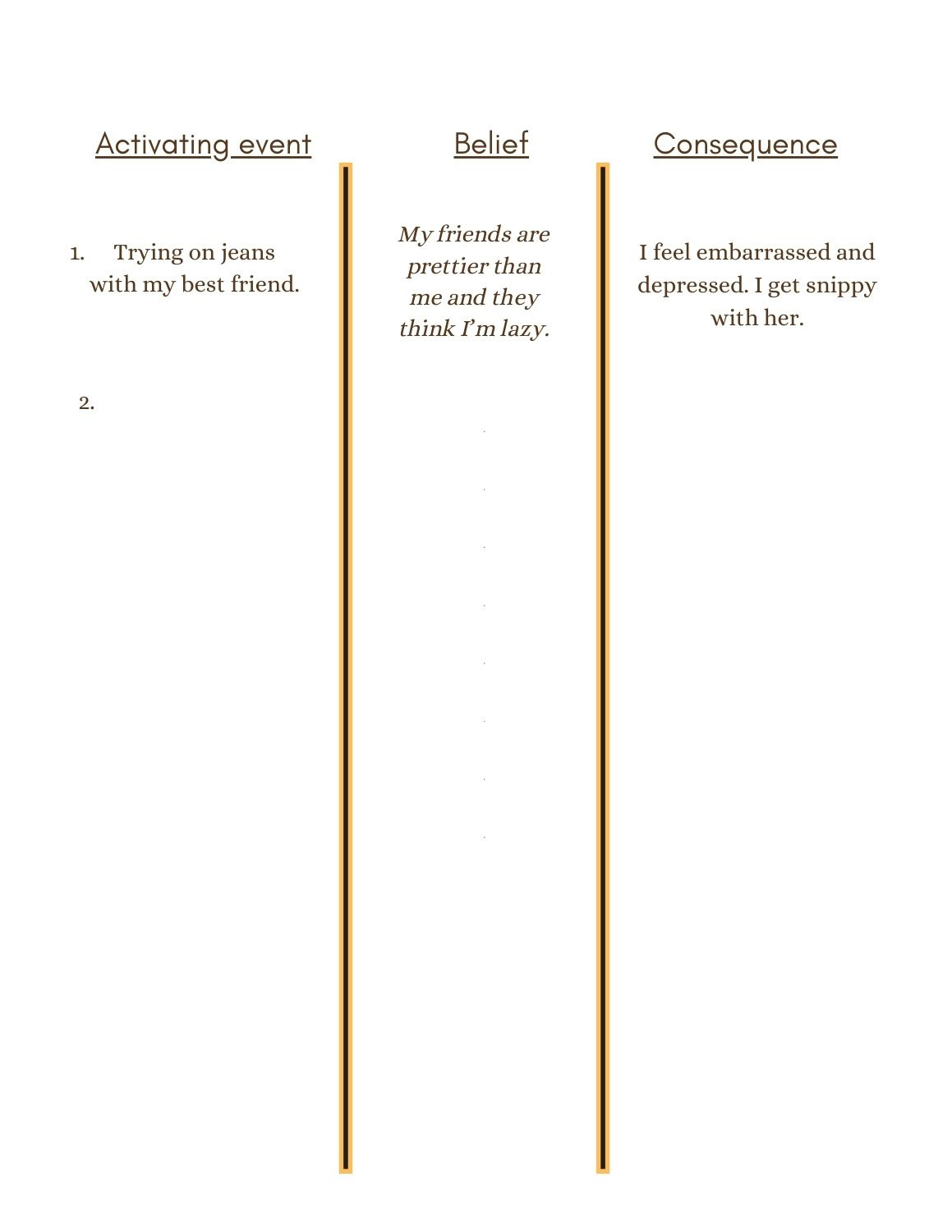What has it been like to identify your Core Beliefs about your body? (If you haven’t yet identified them, the link to last week’s post showing you how to identify your Core Beliefs is at the bottom of this one.)
Some people are shocked to realize how negative their beliefs about themselves are. For others, this clarity is not news. Regardless of how you feel about discovering the beliefs that contribute to what you tell yourself day in and day out, you now have the opportunity to work with those beliefs and change them, if they aren’t benefiting.
Here is your worksheet:
Start by putting the Belief(s) you came up with in the middle column.
Identify an situation that activated, or reminded you that you hold that Belief, and write it in the column on the left.
Now that you see what triggered that Belief to be reinforced, write in the third column what feelings you feel, or what you do, as a result.
Do this with any of the Core Beliefs you’ve identified, flushing out what events bring up the Beliefs and what Consequence happens to you and to those around you as a result.
When you do this exercise, you can actually start with A, B, or C. If you are out in the world and know that a difficult “Activating event” is happening (“omg- I have to stand up in front of my whole company and do a presentation!”) you can write that in and then follow through with what must be the Belief about it/you (“People will judge how I look more than what I say”), and then the Consequence (“As a consequence of this belief, I feel like I have failed at giving my presentation, even before it begins. It is hard for me to focus on what I’m doing while I present because I am so conscious of my body/outfit/hair/facial expressions.)*.
If you are aware of feeling “some kind of way” about something, you can start in the Consequence column and work backwards. Ie: Consequence is feeling ashamed and like I want to hide. When did I start feeling this way…? Activating event: When I was getting ready for work and thinking about the presentation I had to give to the entire company! What Belief must I have about that…? I believe everyone thinks I don’t deserve this job. And that I am the heaviest person in the room. As you link these happenings, you will get more clear on how helpful or unhelpful your Beliefs really are.
“But Kathryn, what does it matter if my beliefs are helping me? It is TRUE that I’m fat/ugly/stupid/worthless/garbage/a shitshow doodoo head!”
The brilliance of BELIEFS is that “truth” doesn’t matter. Note that some people believe capitol punishment is right, some believe it is wrong- there isn’t an absolute truth because even if you believe there is one, there are also many other people who live their lives believing the opposite is true. Think of something else where this is the case. I’m sure you can come up with many examples of things that can be completely bought in to, as can the exact opposite. Regardless of whether something can be proven to be “true,” if you believe something, you will live in such a way to support it.
Such is the case with beliefs about yourself.
If I believe that most people find me engaging and funny, how will I feel when I walk into a room full of people I have yet to meet? Since I know others enjoy me and my humor, I’ll probably feel pretty good about meeting new people who will laugh with me and have a good time in my company.
Likewise, if I believe that people find me annoying and dull, what will I feel like walking in to the same room of strangers? I am still the same person, but my belief is different in this case. “Knowing” I am annoying and dull, I likely won’t be very eager to meet people or interact. Because I am telling myself they don’t like me.
It is clearly much more helpful to me to believe the first belief. I am a better person when I believe positive things about myself! I am approachable, which helps others feel comfortable. I am open to connection, which is a crucial part of being a human. And I will have a good time with that belief.
Hopefully this brief description is enough to explain how little your choice in beliefs has to do with proving something is the “truth.” Some of my clients have gotten very worked up, trying to prove to me that the painful things they believe are very important to keep believing, because “THEY ARE TRUE!” I’m here to tell you that CBT says, “truth” doesn’t matter. All that matters, when it comes to using your mind to improve your mental health, is whether your beliefs are helping or not.
Keep practicing these ABCs in the coming week. Don’t worry- there is relief ahead. You don’t have to stay stuck with these painful beliefs and consequences. Next post will explain how we will Dispute the Beliefs that aren’t working in our favor. And find the mindset that will move us in the direction we’d like.
"Your words have so much power. Every day, if you tell yourself, ‘I love you,’ if you give yourself one word of validation, it will change your mind." — Ashley Graham
*I gave examples of an UN-helpful belief. Your ABC’s could alternately be more like
A) Company Presentation
B) “I will do the best job I can today, and that will be good enough.”
C) I feel nervous, but confident that I will stay focused on what I have to present.
Notice how, in this example, “truth” is irrelevant. Your coworkers may very well judge people for their looks. But since that isn’t helpful to your presentation, a more helpful Belief to focus on is that you will do your best.
What to Do with Broken Records
What repeated messages are under the current of your thoughts without your consciousness? Trying the suggestions given in last week’s post to take notice of the things you are saying to yourself (that you may not be aware of) has hopefully given you a









